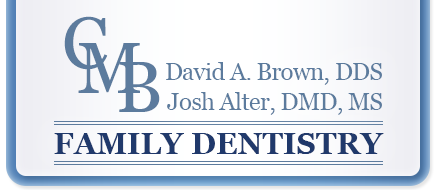Infant and Child Oral Health
By, Josh Alter DMD, MS
As a dentist and a parent with a toddler, I am not only interested in children´s oral heath but I also get asked a lot of questions about how to care for infants and toddlers teeth. In my experience, there is a common misconception about when to start brushing, how often, and what toothpastes parents should be using.
It is extremely important to begin good oral care within the first months of your baby´s life. As the teeth begin to erupt, the dreadful teething stage begins. During this time you may notice that sleep habits change, low grade fevers develop, and diarrhea may present itself. This can be very stressful to a parent, but these occurrences are normal. Medications such as infants acetaminophen (Tylenol), and infants ibuprofen (Motrin) can help ease the pain of teeth erupting through your child´s gums. Remember that it is important to speak to your pediatrician prior to starting any medication regimen as many pediatricians have varying opinions on the use of these drugs. Those looking for a non-pharmaceutical method, a wet washcloth put in the freezer can make a nice "chew toy" for your child. Upon taking this washcloth out of the freezer be sure to dampen it first as a hard frozen washcloth placed on to your child´s soft warm gums can stick to the gums causing pain upon removal (we all remember poor Ralphie and the metal pole in A Christmas Story. OUCH!) Additionally, wiping and massaging your child´s gums with a warm washcloth can be a good way to clean the gums and help teeth near the surface to erupt. Sorry parents, but teething will occur well through age 2 as all the baby teeth continue to erupt. Symptoms can even worsen as the larger molars start to break through the gums.
Around 6 months is when you can start to expect your child´s first teeth, usually the lower front two incisors. Do not be concerned if teeth erupt early (some babies are born with teeth), or if they start presenting themselves later than six months (my child did not get his first teeth until 9 months.) It is important to start brushing as soon as the first tooth. The enamel is thinner, the nerve is larger in proportion, and children´s diets are often high in sugar and carbohydrates. Breast milk, cow milk, and even formula contain the milk sugar lactose. For this reason, it is extremely important to avoid putting your child to bed with a bottle. The sugar in the mouth throughout the night can wreak havoc on your child´s newly formed teeth. Start brushing those teeth with children´s toothbrushes and children´s toothpaste using just a pea sized amount of paste on the brush. At home I use Tom´s of Maine Silly Strawberry organic toothpaste. Data has shown that parental supervision is required during brushing through age 9.
Parents, it is also extremely important to maintain your oral health and seek regular dental care. Studies have shown that the bacteria that cause cavities and gum disease can be transferred from parent to child. Think of how many times your infant or toddler wants to stick their hands in your mouth or has their hands in their own mouth. Maybe you suck on your baby´s pacifier to clean it? Potentially you share eating utensils and food? Parents with active cavities or a history of many cavities or have gum disease are at higher risk for this type of transmission.
The American Dental Association now recommends dental visits beginning at age 1. These visits are more targeted at familiarizing your child with the dentist, than getting a thorough dental cleaning. We know how hard it can be to simply brush your infant/toddler´s teeth much less have them sit down for a professional cleaning. Your child may be resistant to tooth brushing initially, but with practice and developing a routine, it will become easier and you will be able to brush more thoroughly. My son, now 20 months old, even reminded his grandparents to brush his teeth at his most recent sleepover! What a proud dentist/dad I am. The goal for any parent should be to make teeth brushing and dental visits fun and part of your normal routine. Forming good habits and positive attitudes now will last your child a lifetime.
